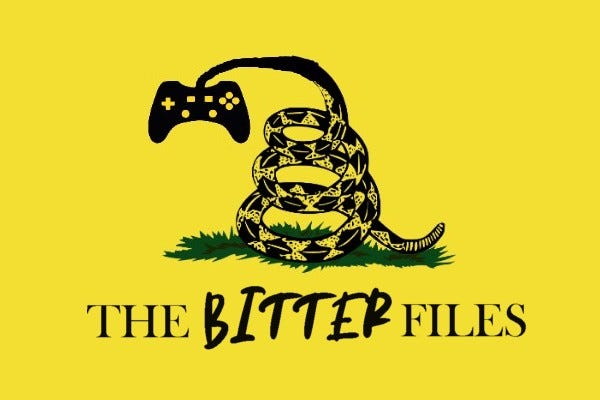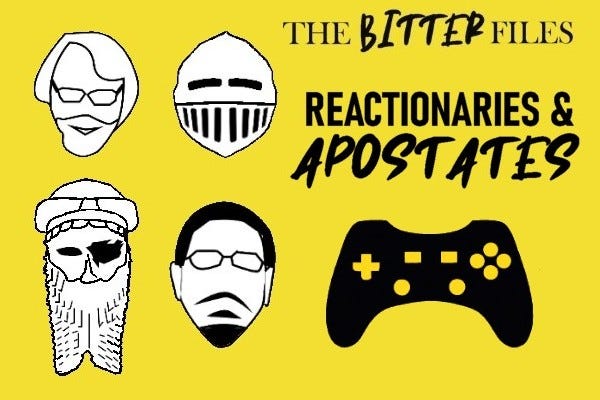Reactionaries and Apostates
The Bitter Files episode 4: The Atheism Wars and the rise of the New Skepticism
This is the fourth episode of a monthly feature for paid subscribers titled The Bitter Files - excerpts from a book I wrote but never finished.
Read here for more information
Episode 1 - What Is a Geek?
Episode 2 - The Masculine Medicine Show
Episode 3 - The Red Pill
👉Episode 4 - Reactionaries and Apostates
Way back in 2011 or so, way before QAnon and Covid vaccine hysteria, I was interested in conspiracy theories and the people who believe them, back when, you know, this topic was still fun. I didn’t buy into them myself, but I wanted to understand why people did. As a result I got pretty far down the rabbit hole of the so-called skeptic community.
Skeptics are strongly motivated by scientific methods of inquiry, and they’re often primarily associated with atheism. I wasn’t strongly motivated to combat religion, but there were other topics that skeptics attacked that interested me, like quack medicine, psychic and paranormal phenomena, and conspiracy theories. The really weird ones, especially, with aliens.
Online, the skeptic movement was spread out across hundreds of blogs and YouTube channels where people would engage in recreational debunking, exposing bad science, fighting religion-based legislation and combating and mocking conspiracy theories.
At the time I became interested, however, I found myself serving two masters in academia. The rationalists I admired for their pushbacks against dogma were butting heads against other disciplines I argued (and still do) that they shouldn’t have beef with—things like philosophy, ethics, and social justice.
In the first episode of The Bitter Files I argued how geek culture came to perceive an enemy in feminism. The genealogy of this culture war’s merger with the skeptic movement is the subject of this episode. And to understand it we have to take a look at what was called the New Atheism movement.
In the very early 21st Century, motivated strongly by the tragedy of September 11, 2001, a number of prominent scientists and thought leaders published almost simultaneous books that declared much more boldly than usual the position of so-called hard atheism—there is no such thing as God. No longer politely pointing out the lack of evidence, furious academic nonbelievers were now going for the throat. It was an early example of cultural figureheads signaling refusal to acknowledge “offense” as a legitimate grievance, which is a sentiment that would soon be weaponised against the so-called SJWs.
The three most recognisable titles among these books were Richard Dawkins’ The God Delusion, Christopher Hitchens’ God Is Not Great, and Sam Harris’ The End of Faith. This new expression of atheism, one that launched from a position of attack, not defense, was unique enough in history to be considered its own intellectual movement. In the words of journalist Gary Wolf:
This is the challenge posed by the New Atheists. We are called upon, we lax agnostics, we noncommittal nonbelievers, we vague deists who would be embarrassed to defend antique absurdities like the Virgin Birth or the notion that Mary rose into heaven without dying, or any other blatant myth; we are called out, we fence-sitters, and told to help exorcise this debilitating curse: the curse of faith.
The New Atheists will not let us off the hook simply because we are not doctrinaire believers. They condemn not just belief in God but respect for belief in God. Religion is not only wrong; its evil. Now that the battle has been joined, there’s no excuse for shirking.1
These three writers as well as the cognitive scientist Daniel Dennett, who authored Breaking the Spell: Religion as a Natural Phenomenon in 2006, presented an intellectual alternative to those who were heartbroken, incensed and infuriated by the 9/11 attacks but did not thirst for Christian vengeance. When zealots struck the nation’s citizens indiscriminately, with no particular care for denomination, those who leaned secular found themselves dragged kicking and screaming onto the field of a team sport for which they were previously content to spectate. While Christian jingoists vowed to wage another Crusade on the Holy Land, the nonreligious were just done with the lot of it.
New Atheism wasn’t truly minted as a distinct movement until Dawkins, Dennett, Hitchens, and Harris sat together for a round table discussion in 2007 that was recorded and published under the title The Four Horsemen. It wasn’t a debate or a Socratic dialogue so much as a two hour long fly on the wall discussion between four blokes from different academic backgrounds but nevertheless a similar intellectual standing.
Notably, the New Atheism project was not a political one in the sense that we commonly understand. Atheism as an ontological stance, as is common among all rationalist positions, is usually held to be apolitical, at least to the extent that anything can be apolitical. All four of the Horsemen can be seen as broadly liberal when held up in comparison to the conservatives who were tangled inseperably with theocracy.
But New Atheism was characteristically a post 9/11 atheism. The laser focus of their rage was on Islam. And when these old, white, ostensibly apolitical men talked about Islam they were describing the very caricature evoked by the west’s response to those attacks—a Dark Age religion. People living on sand dunes without electricity or sanitation. A terrorist cult. A miserable and uneducated foreign barbarian tribe so poisoned by religious fanatacism that the only language they know is violence.
So when forced to be political, the New Atheists found some unlikely allies.
This was the first decade of the 21st Century. There was a new type of Republican in charge. The so-called neoconservatives who rejected both the pacifism of the Democrats and the radical isolationism of the old school paleoconservatives. These were the “world police” Americans. The idealists, burdened with the grand project of bringing liberal democracy—the superior system, the western system—to the rest of the world. Bringing about Fukuyama’s end of history by the pen or by the sword.
The neoconservative administration of George W. Bush and Dick Cheney was all too enthusiastic to use the 9/11 attacks as a springboard to not just retaliate but to expand American influence into the Middle East under the guise of fighting against Islam. The success with which the neocons used the fear and hatred of Islam to wrestle biparisan support for numerous wars speaks to the power of it.
The New Atheists initially escaped the left-right dichotomy of western politics by harnessing this idea that, in the secular west, political differences are largely insignificant. When contrasted against this caricature of the Islamic world, there is simply nothing to complain about.
Anti-Islamist western liberalism, which opposed Islamic theocracy on the same grounds as it opposed Christian theocracy—its bigotry—butted against progressives who saw, in many ways, this to be an extension of western chauvanism and bigotry in itself. The New Atheists, surprisingly, came to find their biggest opposition coming from the left in their own countries. As they threw their hat in with the neoconservatives agitating war in the Middle East, this modern atheism came to be viewed as a reactionary and politically right-leaning movement.
For some among the New Atheists, Bush’s decision to rain full-scale hellfire, so to speak, over the Middle East seemed like the first sane decision the right had had in decades. Christopher Hitchens, who had long considered himself a leftist and a Marxist, was an enthusiastic supporter of the Iraq War, and in light of the left’s condemnation of the war, came to see the neoconservatives as his allies, if only temporarily.2
Sam Harris, too, seems to see himself as having more in common with the right than with the left when it comes to Islam, and in 2015 he expressed significant ideological agreement with neoconservative pundit Douglas Murray, to the point that he said, given the choice between voting for the extreme Christian conservative Ben Carson or leftist intellectual Noam Chomsky, he would enthusiastically vote for Carson, because “he understands that jihadists are the enemy.”3
For members of the atheism community who see Islam as the greatest threat to the west, it can seem like any other discussion is a distraction. Because, of course, human beings can only focus on one issue at a time, and given the choice, it should always be the most serious issue.
After the jump: Islamic Panic, the Ahmed Mohamed clock incident, Atheism Plus, and the New Skeptics.
Keep reading with a 7-day free trial
Subscribe to Plato Was a Dick to keep reading this post and get 7 days of free access to the full post archives.





